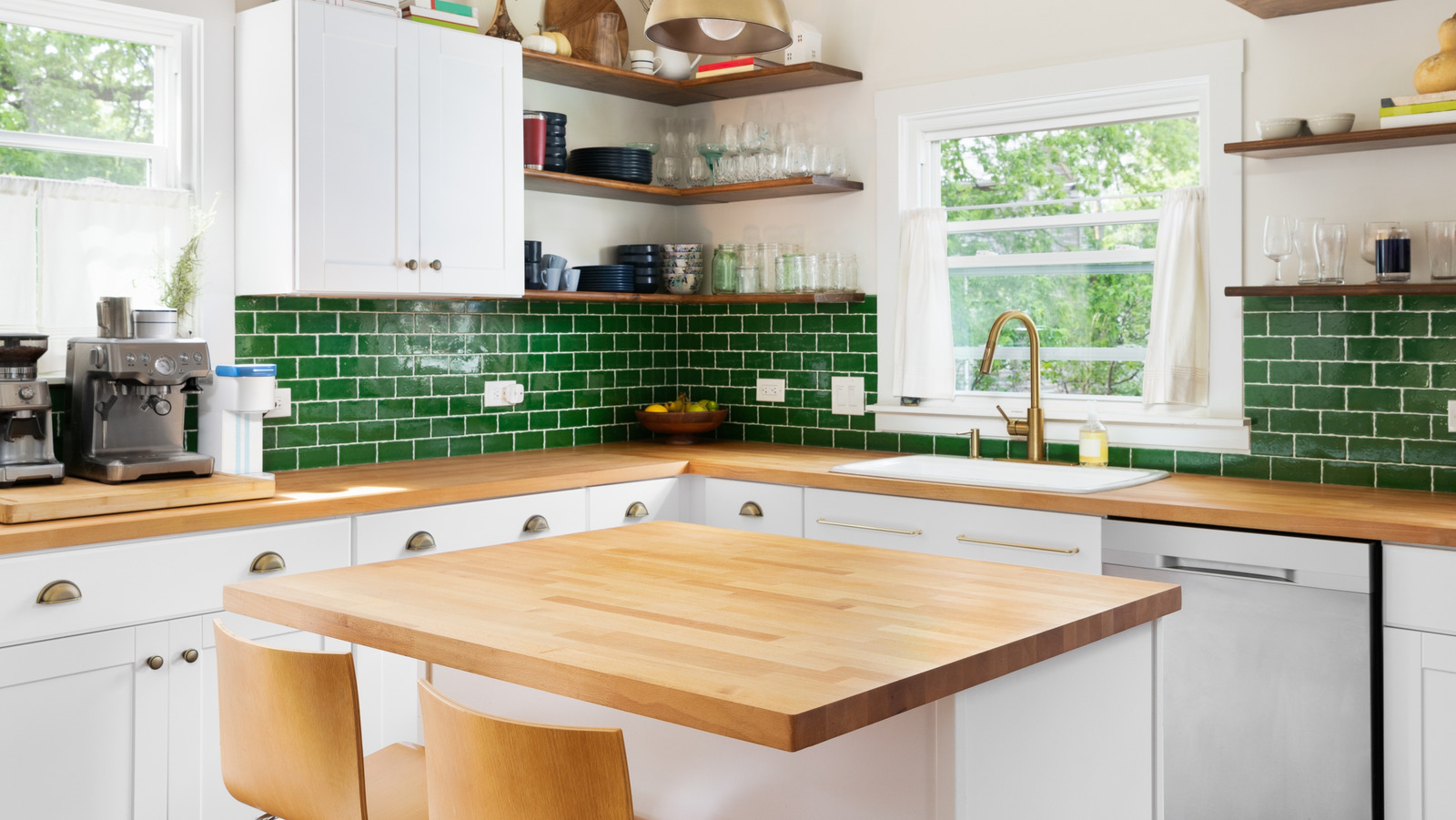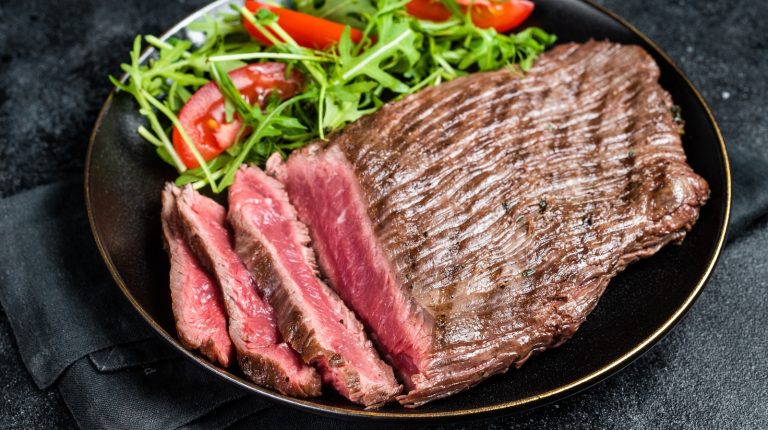If you’re an avid home chef who’s looking to upgrade their kitchen, you may want to consider installing butcher block countertops. Basically, this remodel turns all of your counter space into a cutting board, which can be a very exciting option for those who love to cook. Butcher block counters boast a couple of unique advantages: they’re an inexpensive option, they give your kitchen a nice, natural look, and they’re extremely practical. However, the catch is that these types of counters require a bit more TLC than other varieties. Without proper maintenance, your lovely new counters can quickly become a cesspool of bacteria.
The main obstacle when it comes to keeping butcher block counters clean is cross-contamination. Think about how often you place a glass of water or even your hand on the counters. Then, imagine that you were breaking down a chicken on that same spot a few hours before. Of course, this problem applies to all sorts of cooking surfaces, which is why it’s important to know how to correctly clean and sanitize a cutting board. The only difference with butcher block countertops is that the cleaning is on a larger scale. But never fear, for with a bit of elbow grease and a commitment to hygiene, it’s surprisingly easy to keep butcher block countertops nice and clean.
Daily cleaning
Butcher block countertops should be cleaned with the same frequency as any other cutting board. Ideally, that means wiping them down with every use, but if you’re pressed for time, a daily cleaning should suffice. To quickly clean your butcher block countertops, first dust away any crumbs or large pieces of gunk. Then, use a sponge dipped in a mixture of hot water and dish detergent to gently wipe down the counters before drying them with a cloth. Avoid using harsh chemical cleaning products on your countertops, as this can strip away the oils protecting the wood from becoming warped over time.
You can use some discretion when deciding how intensely to clean the counters after each round of cooking. If you’ve been cooking with ingredients that attract a lot of bacteria, like raw meat, you should definitely sanitize your countertop before doing anything else. However, if you’re just dealing with a few bread crumbs or spilled spices, you can probably get away with just giving the counters a quick wipe with a damp microfiber towel. Cleaning your butcher block counters every day might sound daunting, but the process is a lot easier if you clean as you cook.
Deep cleaning
Giving butcher block countertops a deeper clean takes a few more supplies, but you probably already have everything you need sitting in the kitchen. The countertops should be thoroughly disinfected after dealing with ingredients like meat, but even if you keep a meat-free home, weekly sanitizing sessions are key to keeping your counters as clean as possible. Luckily, one of the most powerful (and natural) sanitizers around is a spray bottle full of white vinegar. Simply spray down your cooking station, then use a sponge or cloth to make sure the vinegar is covering every inch. After 10 minutes or so, you can use a clean towel to wipe up the excess vinegar or let it evaporate away.
After sanitizing, the next step is to use a mixture of lemon juice and salt to scrub away stains or gunked-on bits of food. Whisk together about one part salt to two parts lemon juice until a paste forms, then liberally spread the paste over the counters. If you’re trying to target a specific stain, leave the mixture on the affected area for a few minutes before wiping everything up with a damp sponge. The benefits of using these ingredients for cleaning are that salt is abrasive enough to scrape away grime without causing damage to the wood, while the acidic lemon juice works as a natural disinfectant.
Moisture and mold
Anyone who has ever pulled a warped wooden spoon out of the dishwasher knows that water and wood cookware are not on speaking terms. Being exposed to water for long periods of time can cause wood to bend and for the individual planks that make up a butcher block countertop to separate. This in turn creates more nooks and crannies for crumbs to hide in. Fortunately, this is easily prevented by sopping up any wet spots on the counter with a towel or sponge as soon as you notice them.
One less innocuous side effect of overly wet butcher block countertops is mold. It doesn’t take a lot of imagination to think of how quickly a giant moldy cutting board can lead to serious illness; needless to say, it’s a situation best avoided. If your counters start to smell funky, or you see bits of fungi growing in the cracks, it’s time to give them a serious scrub down. Being infected with mold is one of the few times it’s okay to use heavy chemicals on butcher block countertops. In this case, you’ll need to make a solution with a tablespoon of bleach per gallon of water. Liberally spray the bleach solution onto the counters and wait a few minutes before rinsing everything with hot water. To ensure your counters dry completely, you may want to turn on the kitchen fan or open a window in addition to wiping down the counters.
Oiling and conditioning
Once your butcher block countertops have been sufficiently scrubbed, sanitized, and scraped, they might be left looking a little dull. This isn’t just a cosmetic issue; butcher block counters that have lost their layer of seasoning are more prone to becoming water damaged. All you need to recondition the counters is food-grade mineral oil or conditioning oil specifically made for butcher blocks, like this product from Amazon. But before you restore your counter’s sheen, take a moment to fix any deep nicks. These grooves can collect food and moisture over time, and are best buffed out with a piece of fine grit sandpaper (you can also use sandpaper on especially stubborn stains).
After ensuring the counters are smooth, clear of debris, and dry to the touch, you’re ready to add the oil. Drizzle the oil over the countertops, then use a clean towel to create an even coat, working in small circles. Let the oil sit for at least an hour before repeating the process. Taking time to season butcher block countertops is one of the best ways to guarantee they last a long time.
What to avoid
Butcher block counters are made to be durable, but they’re not invincible, and using them improperly can lead to them quickly deteriorating over time. One of the quickest ways to permanently ruin your countertop is by setting hot cookware on it. Pots and pans straight off the stove can cause severe damage to the wood, including burn marks that will take a whole lot of sanding to remove. Another hard-to-remove stain comes from water, which is another reason to always keep your counters as dry as possible.
It’s also important to be mindful of how you organize your butcher block counter space. Avoid keeping too many odds and ends on the counter. Things like cookbooks, decorations, and appliances attract dust and create mess, so keep them in a separate area from your usual cooking space. Otherwise, it can be extremely tedious to clean around the clutter, not to mention the heightened risk of missing a piece of cheese that fell behind the toaster or a drop of meat juice that splattered onto your favorite fruit bowl. As long as you’re giving your counters a makeover, you might as well learn how to keep your knives in tip-top shape too.




